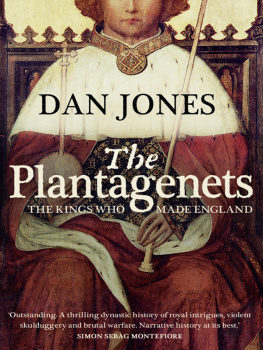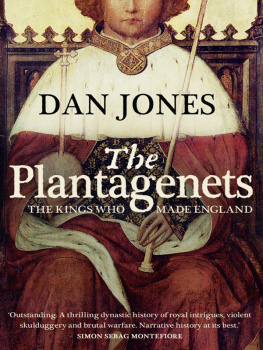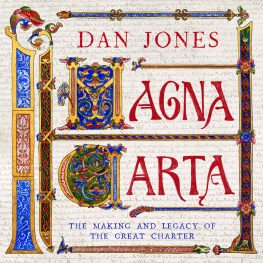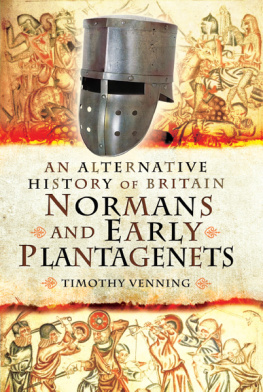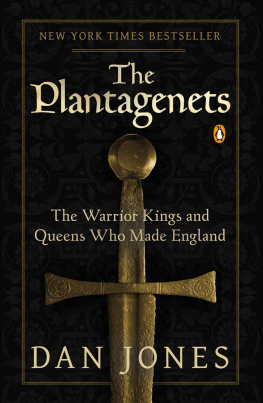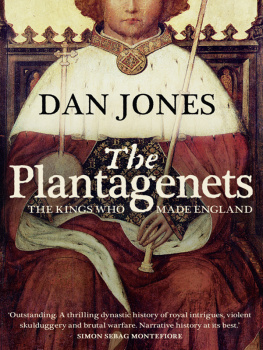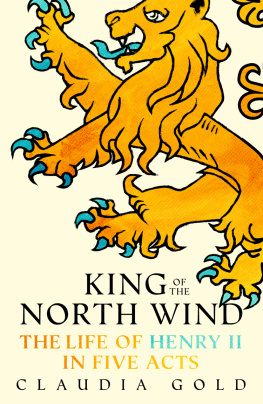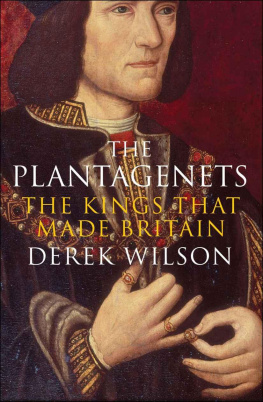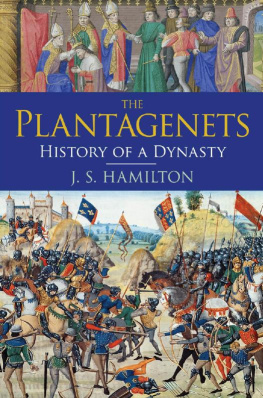Who were the Plantagenets? The name was not used by any of the characters in this book to describe themselves, with the exception of one: Geoffrey, count of Anjou, a handsome, belligerent, red-headed young man born in 1113, who wore a sprig of yellow broom blossom in his hat and decorated his shield with lions. It was from the Latin name ( planta genista ) of the broom that the name Plantagenet derived, while lions passant guardant would become the heraldic symbol of English kingship, carried before vast armies who took to the field everywhere from the chilly Lowlands of Scotland to the dusty plains of the Middle East. There is some irony here: Geoffrey never visited England, took scant direct interest in the affairs of the realm and died in 1151, three years before his eldest son inherited the English Crown.
Nevertheless, Plantagenet is a powerful name. The kings who descended from Geoffrey ruled England for more than two centuries, beginning with Henry II, who inherited the Crown in 1154, and ending with Richard II, who was relieved of it by his cousin Henry Bolingbroke in 1399. They were the longest-reigning English royal dynasty, and during their times were founded some of the most basic elements of what we today know as England. The realms borders were established. Her relationships with her neighbours principally Scotland, Wales, France and Ireland, but also the Low Countries, the papacy and the Iberian states that would eventually become Spain were established. Principles of law and institutions of government that have endured to this day were created in their essential forms some deliberately, others by either accident or under duress. A rich mythology of national history and legend was concocted, and the cults of two national saints Edward the Confessor and St George were established. The English tongue rose from an uncultured, rather coarse local dialect to become the language of parliamentary debate and poetic composition. Great castles, palaces, cathedrals and monuments were raised, many of which still stand as testament to the genius of the men who conceived them, built them, and defended them against attack. Heroes were born, died and became legends; so too were villains whose names still echo through the pages of history. (Some of those villains wore the crown.) Several of the most famous and dramatic battles in European history were fought, at Bouvines and Bannockburn, Sluys and Winchelsea, Crcy and Poitiers. Military tactics were revolutionized between a Norman age in which warfare was the art of siegecraft, and the dawn of the fifteenth century, during which pitched battles were commonplace and the English with their brave men-at-arms and deadly mounted archers were the scourge of Europe. Likewise, by the end of the Plantagenet years the English had begun to explore art of war on the open seas. Naval tactics lagged some way behind tactics in the field, but by the middle of the fourteenth century something resembling an English navy could be deployed to protect the coasts and attack enemy shipping. It is undeniable that during the Plantagenet years many acts of savagery, butchery, cruelty and stupidity were committed, but by 1399, where this book ends, the chilly island realm which had been conquered by William, the bastard of Normandy, in 1066 had been transformed into one of the most sophisticated and important kingdoms in Christendom. At its heart lay the power and prestige of the royal family.
That is the process described in this book; but this is also a book written to entertain. It is a narrative history, and it tells some of the great stories of England which took place between the sinking of the White Ship in 1120 and the solemn deposition of Richard II in 1399. They include the great civil war between Stephen and Matilda; the murder of Thomas Becket by Henry IIs knights; the Great War of 11734; Richard Is wars against Saladin on the Third Crusade; the Barons War against King John and the agreement of Magna Carta; Henry IIIs hapless attempts to deal with the barons of a later age including his brother-in-law and nemesis Simon de Montfort; Edward Is campaigns in Wales and Scotland; Edward IIs peculiar romance with Piers Gaveston and his dismal abdication in 1327; Edward IIIs provocation of the Hundred Years War, in which he fought alongside his son the Black Prince and captured the king of France, and the subsequent institution of the Order of the Garter to celebrate Englands new martial supremacy; the fierce mortality inflicted on Europe by the Black Death; Richard IIs heroism against Wat Tylers rebels during the Peasants Revolt of 1381, which was followed by Richards tyranny and his final fall, deposed by Bolingbroke. These stories are exciting in their own right; they are also part of an English historical canon that still, even in the cultural chaos of the twenty-first century, defines England as a nation and as a people. The Plantagenet kings did not just invent England as a political, administrative and military entity. They also helped to invent the idea of England an idea that has as much importance today as it ever has before.
This is a long book, and it could have been longer still. For ease of reading I have divided the text into seven sections. Part I, Age of Shipwreck, illustrates the dismal state to which England had sunk by the end of its period of Norman rule, which began under William the Conqueror and continued during the reigns of two of his sons, William Rufus and Henry I. After the death of the latter, a vicious and paralysing civil war engulfed England and Normandy. It was fought between rival claimants, the Conquerors grandson King Stephen and his granddaughter the Empress Matilda, and it took nearly two decades to resolve it in favour of the latter. During that time England was effectively partitioned between two courts and two competing governments, leaving public authority splintered and the countryside a smouldering ruin, infested with mercenaries. Only with the accession of Matildas son her eldest child by Geoffrey Plantagenet, a dishevelled, quick-tempered but brilliant boy known as Henry FitzEmpress was the realm reunited and restored to good governance. Henry FitzEmpress became Henry II, and through a combination of some good fortune, immense personal energy and a great deal of military capability and hard-headed purpose, Henry set about establishing himself, and by association the English Crown, as the master of a patchwork of territories reaching from the borders of Scotland to the foothills of the Pyrenees.

